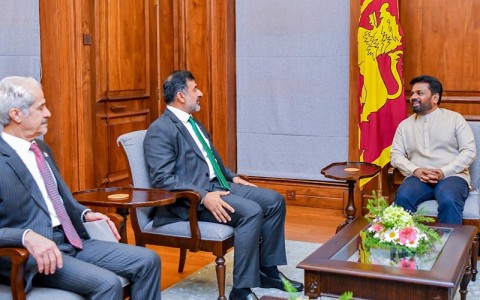
The United Arab Emirates (UAE) has pledged its support to the Sri Lankan Government’s efforts to create a developed and prosperous nation.
During a high-level meeting at the Presidential Secretariat today (12) the UAE Ambassador to Sri Lanka, H.E. Khaled Nasser Al Ameri, assured President Anura Kumara Dissanayake of the UAE’s commitment to strengthening bilateral relations.
The Ambassador highlighted plans to increase investments in Sri Lanka and share technical expertise in digitalization and modern technology.
Highlighting the strong bilateral ties between the two nations, Ambassador Al Ameri emphasized efforts to further boost economic collaboration.
He announced plans to increase investments in Sri Lanka and provide technical assistance to foster innovation and modernization.
The discussion also addressed the significant role played by the 150,000 Sri Lankans currently employed in the UAE. Both parties explored avenues to expand employment opportunities for Sri Lankan workers in the UAE, further strengthening economic ties.
The UAE, Sri Lanka’s sixth-largest export market, was identified as a key area for growth. Talks were held on diversifying and expanding Sri Lankan exports to the UAE, underscoring mutual interest in boosting trade.
Ambassador Al Ameri reiterated the UAE’s commitment to fostering a long-standing friendship and assured that the UAE would provide support to Sri Lanka whenever needed.
As a gesture of goodwill, the Ambassador extended an official invitation to President Dissanayake to visit the UAE.
The meeting was also attended by Mr. Ahmad M.A.A. Al Shehhi, Minister Plenipotentiary of the Embassy of the UAE in Colombo, further solidifying the cooperative spirit between the two nations.
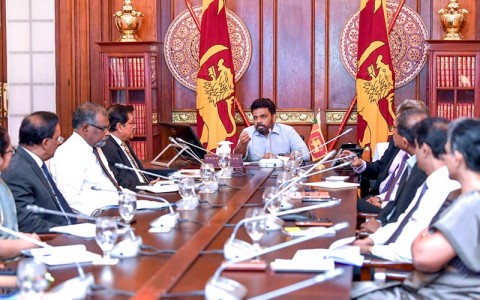
President Anura Kumara Dissanayake has directed the Ministry of Finance to implement measures to enhance the efficiency and resilience of Sri Lanka’s financial system. The President provided these instructions during a discussion with Finance Ministry officials at the Presidential Secretariat today (12).
Highlighting the Central Bank’s crucial role as an independent institution, President Dissanayake assured that the government would extend its full support and resources to stabilize the country’s finances.
He emphasized the importance of creating an effective mechanism to streamline banking and financial operations, ensuring efficiency and accessibility.
The meeting also focused on the Central Bank’s commitment to studying and closely analyzing developments in the economy and the financial system as a whole, and focus on implementing new policies to ensure financial stability and enhance the resilience of the financial system.
Further discussions focused on enforcing macro prudential policies within the financial sector. With the gradual stabilization of the economy, the emphasis has shifted to fostering safe growth in asset quality, prudent risk management, and capital building. These measures are expected to contribute to the strong performance and sustainability of the financial system in the coming years.
Key participants included Minister of Justice Harshana Nanayakkara, Minister of Labour & Deputy Minister of Economic Development Prof. Anil Jayantha Fernando, Deputy Minister of Finance and Planning Dr. Harshana Suryapperuma, Secretary to the Ministry of Finance Mahinda Siriwardena, and Governor of the Central Bank Dr. Nandalal Weerasinghe, alongside other senior officials.
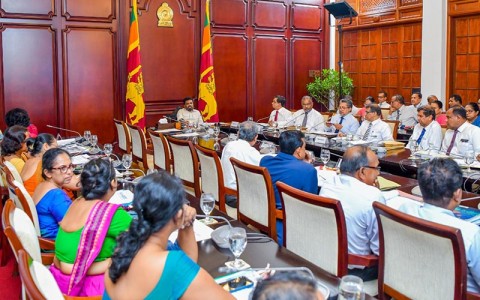
Preliminary discussions for the preparation of the budget 2025 have commenced at the ministry level under the leadership of President Anura Kumara Dissanayake.
In line with this, a discussion on the budget proposals related to the expenditure heads of the Ministry of Agriculture, Livestock, Lands, and Irrigation was held at the Presidential Secretariat this afternoon (10).
The meeting was attended by Dr. Nandika Sanath Kumanayake, Secretary to the President, Mahinda Siriwardena, Secretary to the Ministry of Finance, D.P. Wickramasinghe, Secretary to the Ministry of Agriculture, Livestock, Lands and Irrigation, and senior officials from the Ministry.
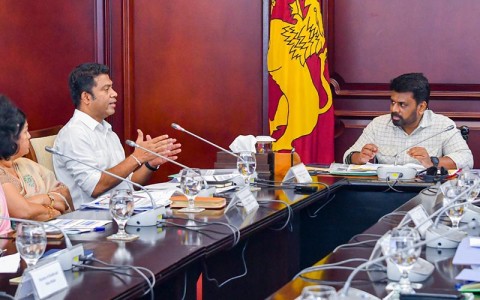
Preliminary discussions at the ministerial level for the preparation of the 2025 Budget have commenced under the leadership of President Anura Kumara Dissanayake.
As part of this process, a meeting focused on the budget proposals related to the expenditure heads of the Ministry of Health and Media was held this morning (10) at the Presidential Secretariat.
The discussion was attended by Minister of Health and Media Dr. Nalinda Jayatissa, Secretary to the President Dr. Nandika Sanath Kumanayake, Secretary to the Ministry of Finance Mahinda Siriwardena, and several senior officials from the ministry.
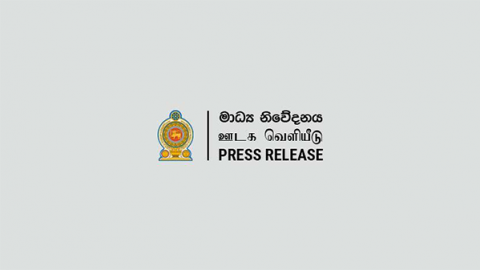
I think the recent people’s mandate has clearly demonstrated society’s aspirations to all of us. On several occasions, the mandate by the people of our country has been conveyed in different ways. On some occasions, it has been given in the context of ending a war, while on other occasion, it has emerged as a significant component in ensuring democracy. I believe that the foremost priority of the 2024 mandate reflects the people’s desire to combat bribery and corruption. Present here are officials from the Commission to Investigate Allegations of Bribery or Corruption, police officers, representatives from the Attorney General’s Department, and individuals from various other critical fields, including the judiciary. I am here in my capacity as a political representative.
We are all empowered by the Constitution. The laws enacted by Parliament have conferred power upon each of us. These laws, along with regulations and circulars, have delegated authority. All of us have been entrusted with power within the Constitution and the law. However, all that power is derived from the sovereign authority of the people. Thus, the laws we adhere to, the limitations imposed upon us, above all that we are all subject to the mandate and sovereign power of the people.
“Let us become exemplary forbearers of a proud nation.” This is what we aspire to be. Now, who is missing here? I am present as a political authority. The Secretary to the President, the Secretary to the Prime Minister, and other senior state officials are present. Justices of the Supreme Court are here. The Inspector General of Police and the Secretary to the Ministry of Defence are here. The Chairman and Commissioners of the Bribery or Corruption Commission are also present. So, who else is missing? Where, then, is the problem? If we observe this honestly, the issue lies here. How can a file in the Criminal Investigation Department (CID) move up and down, or remain stuck for seven or eight years in a cupboard? Is this not where the problem lies?
Please do not take my comments personally. The gravity of today’s societal plight is undeniable. Consider the delay in file handling. How can a file referred by the CID remain inactive for seven years? Where is the root of the problem? How can a court case take seven to eight months to process or to receive a new date? Each institution might have its own explanation or justification in this regard. The CID may argue that the sheer number of complaints overwhelms their capacity and that they lack adequate officers to investigate and file cases properly. The Bribery Commission and the Attorney General’s Department might offer similar reasoning. However, this issue is not external to us. If each of us fails to make a sincere effort, then we are the problem. Without personal integrity and commitment, we cannot become the “exemplary forbearers” we aspire to be. The question, therefore, is how will the general public hold us accountable? The core issue here is how we tackle bribery and corruption. I believe we must first examine our own conscience and actions. Let me assure you of one thing. As a political authority, I will use the powers entrusted to me fully and with utmost honesty to combat fraud and corruption. You can be confident of my unwavering commitment to this cause.
But I know my limitations. I can provide the political leadership for that. I can provide the necessary infrastructure. I can allocate the necessary funds. But who should take the initiative? I believe it should be you.
We are now ranked 115th. I think we are in this position because of the lack of accurate information. If precise information were available, our position might be higher. Recently, a series of investigations were carried out that drew global attention. One such case involves Imam Subheru, a CIA agent in the United States, who was sentenced under the Money Laundering Act. During the investigation, it was revealed that he had received USD 06 million from the Central Bank of Sri Lanka (CBSL). Presently there is a court case in the United States that involved the CBSL.
Another significant case was heard in the High Court of England regarding Airbus Company offering bribes to officials in order to secure purchase of aircrafts in respective countries. This investigation conducted collaboratively by the United States, France and England. It was revealed that Airbus Company had also paid bribes to Sri Lankan Air Lines.
A case was heard in the US where the Sri Lankan Ambassador was convicted under the Money Laundering Act for purchasing of a new embassy building. He admitted guilt. He apologized to the court.
Moreover, when the Pandora Papers and Panama Papers were published, Sri Lankans also implicated there. In Australia, an investigation revealed that an Australian company had paid bribes while supplying medical equipment to the Hambantota Hospital. When the investigation is going on, Hambantota takes the spotlight.
Let’s set aside our country’s internal issues for a moment. This has happened to our country. But have we managed to conduct thorough and fair investigations into such incidents? Have we held the real perpetrators accountable and delivered justice? The power we hold comes from the collective strength of the citizens of this country. It is through their hard work and wealth that we receive our salaries and privileges. But in return, have we upheld justice and fairness for them?
No. What we are doing, in many instances, is repeatedly using the power entrusted to us to engage in corruption. The people have given this power for us. They have granted us privileges and provided us with salaries. But what do those entrusted with these responsibilities do? They misuse their power and privileges to engage in bribery and corruption repeatedly. That is the reality. Isn’t that right?
Power is meant to uphold justice. But instead, it is often used for injustice, personal gain and the accumulation of wealth. So, I ask, what is the true outcome of this power?
Therefore, if we do not come to a firm and collective determination, acknowledging that the power we hold is derived from the people and must serve justice and fairness, then no matter what institutions we build or laws we create, they will have no meaningful impact.
I am not suggesting that laws are unnecessary or that institutions should not be strengthened. If existing laws are insufficient, let us create more. If current institutions are inadequate, let us establish additional ones. But no matter how many laws we draft or institutions we build, they will amount to nothing if those who hold power are unwilling to carry out their duties and responsibilities.
In my time, I have witnessed many people, to be honest, misusing their power. It is implausible that the Attorney General’s Department has kept a file locked away for seven years. Similarly, it is unacceptable that certain files remain untouched from the day they are filed until they are deteriorated. Investigations by the CID should not drag on until the evidence and documents deteriorate. These are not mere institutional issues but reflect the misuse of authority entrusted to these entities. Without addressing such abuse, meaningful progress cannot be achieved.
In 2021, 69 cases were concluded, and of these, 40 were withdrawn. Out of the 69 cases that were concluded, 40 have been withdrawn. Why was crucial evidence withheld in high-profile cases, such as the Malwana land case? Why are the officers who conducted investigations not listed as witnesses in certain cases? For example, Shani Abeysekara, as a key investigator, must testify. What happens to the credibility of a case when such critical witnesses are excluded?
In 2022, 89 cases were filed, and 45 of them were withdrawn. If we are accountable to the citizens of our country, shouldn’t we provide a clear explanation for this? Why is it that, in specific cases, the investigating officer is not listed as a witness? If we are truly bound to serve the people, we must clarify this. Why are cases being dismissed without calling witnesses in some instances? If we are committed to transparency, we must explain this to the public. Why are we withdrawing cases, and why is this not being communicated to the citizens? If documents have been stuck in drawers for seven or eight years, shouldn’t we explain to the people why this is happening?
Therefore, the entire system has collapsed as a unified structure. If we are to rebuild our country, this entire system must be restored. A small legal reform or minor institutional restructuring alone will not suffice to achieve this goal. At most, such measures might only take up five years of my time, but to truly transform the system, a comprehensive restoration is essential. Without that, achieving meaningful success will be impossible. Personally, I am striving to restore this entire system and turn the state into a well, functioning one. That is my aspiration. I firmly believe that if we fail to accomplish this at this critical moment, the people of our country will not even dare to dream of a prosperous state.
If we fail to fulfil the hopes and expectations set by the people in this 2024 mandate, the citizens of our country will never even dream of a better future. People from North, East, Sinhala, Tamil, Muslim have come together, without division, to form a collective force driven by a shared purpose and hope. If we fail to achieve that purpose, I repeat, the people will never again pray for a better day.
Therefore, we have a responsibility to fulfil this task. To carry out this responsibility, both I personally and our government are committed to properly executing our duties. However, your support is essential. If the institutions conducting investigations, those supporting them and the institutions reviewing and making decisions on those investigations do not actively contribute, we could continue to celebrate Anti-Corruption Day for many more decades. We can all gather with sincere intentions, participate in Anti-Corruption Day, and leave with applause for our participation only.
But if we are ready to change, next year we can celebrate real progress, recognizing that this is something we can achieve. However, as our Chairman mentioned, the score in 2012 was 40. If it has decreased to 34 by 2024, should we celebrate the next day here, increasing the score? Should we continue celebrating as a corrupt state on December 9th?
Since 2012, what has really happened as we commemorate each year? Each year, as we mark the occasion, the unfortunate reality is that corruption has escalated rather than diminished, while we celebrate on December 9th, which is fine, but I must emphasize that our right to celebrate stems not from the date itself, but from how well we have honoured the aspirations and expectations associated with it. If we fail to uphold these ideals, I believe that sitting down to commemorate the occasion next December will serve no purpose.
Celebration, in my opinion, should be grounded in a renewed commitment and a decisive turning point. It should come from a deep sense of achievement. That is why I firmly believe that any commemoration we undertake must reflect tangible progress.
Looking ahead, we must ask ourselves whether we can celebrate in a way that genuinely involves our citizens. Could this small hall gather enough people to truly celebrate? Yes, it is possible. However, for citizens to find meaning, devotion, respect, and value in such a commemoration, it is essential that we earn their trust through credible actions.
Therefore, I am aware of the volume of complaints you handle. I understand the nature of those complaints. Remember, we have an idea of when those complaints were lodged and who the accused individuals are. But does the weight or lightness of a file depend on the name it contains? What difference does it make?
Our Judge has emphasised that we must prioritize cases that significantly impact the economy and should expedite cases related to economic progress. However, I have the report dated March 06th.
Let me remind you of an instance when then the Deputy Secretary of Parliament Mr. Iddawela made a parliamentary address, highlighting that in a single year, the Bribery Commission had punished only two Police Constables, a Grama Niladhari, an SI officer and a clerk. Two others were also convicted, though I can’t recall their names now. This reflects a troubling reality: the law operates like a spider’s web, trapping small offenders while allowing the powerful to escape.
This is well-known to the citizens of this country. While there are individuals with extensive experience in law and legal processes, we all recognize that the public must regain trust in the fair enforcement of the law. Currently, such trust is lacking. Justice delayed, in effect, becomes justice denied. Justice must be delivered swiftly to uphold its true value. Therefore, I believe the time has come for us to question ourselves. Are we sincerely prepared to take on this responsibility with integrity?
The decline of institutions is not a result of your own intensions or on natural circumstances but of an unpleasant political culture that has eroded their fundamental values. I am aware that the former Director General of the Bribery Commission was summoned to the Presidential Secretariat. If you recall he was a Mr. Ranasinghe from Kurunegala. What happened was he was instructed to conduct an investigation about a Minister overnight. The confidence of citizens in institutional systems has been shattered, and institutions themselves have lost faith in their own authority. This deterioration is due to the corrosive effects of this political culture.
While we may not reverse this situation entirely in a year or two, we are committed to making a meaningful effort. The next generation will not take up this fight; it is up to us. We must act as a generation that strives to bring about this change. Our responsibility is to lay the foundation for a positive transformation. As political authorities, we are ready to provide that initial effort.
I request you as a group of experts to support us in this noble effort. If we here today fail to act, who will? Will a farmer living in a remote village such as Dehiattakandiya, or an ordinary citizen, take on this task? It is our responsibility, and if we do not fulfil it, no one will. Therefore, I believe you must fulfil the duties entrusted to you. Let us all work together to ensure that by December 9th next year, we will have added real value to this commemoration.
Thank you all very much!
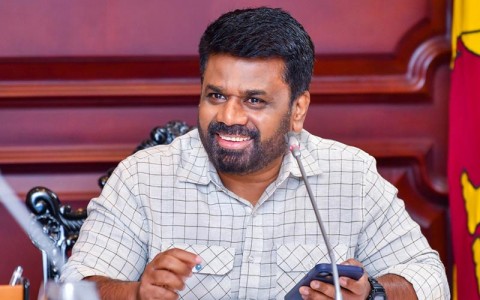
Preliminary discussions at the ministerial level for the preparation of the 2025 Budget have commenced under the leadership of President Anura Kumara Dissanayake.
As part of this process, a discussion on budget proposals related to the expenditure heads of the Ministry of Education was held this morning (10) at the Presidential Secretariat.
The meeting was attended by Prime Minister Dr. Harini Amarasuriya who is also the Minister of Education, Higher Education and Vocational Training; Deputy Minister of Education and Higher Education Dr. Madhura Seneviratne; Secretary to the President Dr. Nandika Sanath Kumanayake; Secretary to the Ministry of Finance Mahinda Siriwardena; and Secretary to the Ministry of Education Nalaka Kaluwawa, along with several senior officials from the respective ministries.
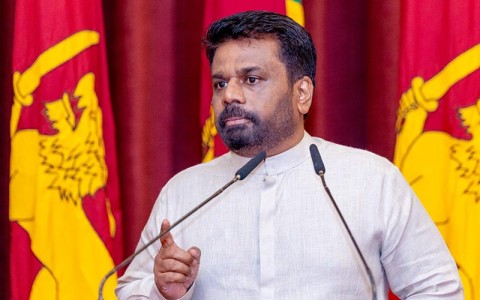
- The 2024 mandate is a mandate given to eliminate fraud and corruption.
- The CIABOC should disclose to the public the reasons for withdrawing 40 out of 69 cases filed in 2021 and 45 out of 89 cases filed in 2022.
- In Sri Lanka, the law has been implemented much like a spider’s web—small animals become ensnared, while larger entities are able to break through and evade it.
- If Sri Lanka is to be rebuilt, the entire state system must be replaced.
– President Anura Kumara Dissanayake stated during the International Anti-Corruption Day celebration.
President Anura Kumara Dissanayake emphasized that no matter how many laws are enacted or institutions are established, justice cannot be ensured to the citizens if those responsible for enforcing them fail to implement them properly.
He further highlighted that the power entrusted by the people must be utilized to serve them; otherwise, that power becomes meaningless.
President Dissanayake made these remarks during a ceremony held today (09) at the Bandaranaike Memorial International Conference Hall (BMICH) to mark the “International Anti-Corruption Day National Celebration – 2024.”
This year’s International Anti-Corruption Day is being commemorated under the theme, ” Uniting with Youth against Corruption: Shaping tomorrow’s Integrity.”
The President pointed out that Sri Lanka already has sufficient laws and institutions to combat bribery and corruption. However, he called for introspection, urging all to examine their conscience and question whether these mechanisms are truly being employed to prevent misconduct.
President Anura Kumara Dissanayake described corruption and bribery as a social tragedy and questioned the relevance of celebrating International Anti-Corruption Day, given Sri Lanka’s decline in rankings from 79th in the international index in 2013 to 115th in 2023.
He highlighted that corruption and fraud have worsened year by year, stressing that if tangible progress is not made in reducing these issues by next year, such celebrations would hold no real value.
The President also noted the performance of the Commission to Investigate Allegations of Bribery or Corruption (CIABOC), revealing that 69 cases were filed in 2021, of which 40 were later withdrawn. Similarly, in 2022, 89 cases were filed, and 45 were subsequently withdrawn.
President Dissanayake emphasized the need to inform the public about the reasons behind the withdrawal of bribery and corruption cases and to disclose why investigating officers failed to appear as witnesses in these cases.
Highlighting that the Bribery or Corruption Commission had convicted only two constables, a Grama Niladhari, and a clerk in a single year, the President noted a widespread public perception that the law in Sri Lanka operates like a spider’s web—where small offenders get caught, while powerful individuals escape unscathed.
The President stressed that rebuilding the country requires a complete overhaul of the state system, asserting that a healthy and functional state cannot be created without such reforms.
He further pointed out that the public’s trust in the legal system and its institutions has been eroded, emphasizing that justice delayed is justice denied.
The President urged collective dedication to transform Sri Lanka into a state with minimal corruption, which he said is essential to restore citizens’ confidence and fulfill their expectations.
As part of these efforts, the United Nations Development Program (UNDP), through its JURE project, has trained over 1,000 government officials to serve as exemplary officers. President Dissanayake formally conferred appointments to 15 of these trained officials.
Secretary to the President Dr. Nandika Sanath Kumanayake, Secretary to the Prime Minister G.P. Saputhanthri, Secretary to the Ministry of Public Security D.W.R.B. Seneviratne, Governor of the Central Bank of Sri Lanka (CBSL) Dr. P. Nandalal Weerasinghe, Acting Inspector General of Police (IGP) Senior DIG Priyantha Weerasooriya, Chairman of the CIABOC W. M. N. P. Iddawala, Supreme Court Justice Yasantha Kodagoda, foreign ambassadors and CIABOC officials were also present.
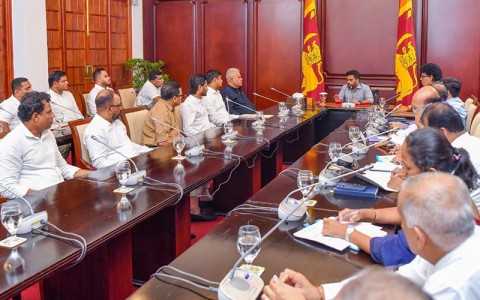
• President Emphasizes Strict Action against Traders Not Adhering to Controlled Rice Prices
• White Rice Prices: Wholesale Rs. 215, Retail Rs. 220
• Imported Nadu Rice Retail Price Set at Rs. 220
• Samba Rice Prices: Wholesale Rs. 235, Retail Rs. 240
• Keeri Samba Prices: Wholesale Rs. 255, Retail Rs. 260
• President Inquires About Frequent Daily Price Fluctuations in Rice
• Consumer Affairs Authority Directed to Monitor Daily Rice Production
President Anura Kumara Dissanayake has directed rice traders to sell Nadu rice to consumers at a wholesale price of Rs. 225 per kilo and a retail price of Rs. 230 per kilo.
The President also instructed the officials Consumer Affairs Authority to closely monitor the situation over the next ten days and strictly enforce the law against rice mill owners who fail to comply with the fixed prices.
President Dissanayake made these remarks during a meeting with officials from the Ministry of Trade, Commerce, Food Security and Cooperative Development, along with rice traders, at the Presidential Secretariat today (07).
The President highlighted that the largest investments in the country are allocated to the Ministry of Highways, followed by the Irrigation and Agriculture sectors, with substantial subsidies provided to farmers.
The President further pointed out that low-interest bank loans have been provided to traders for the purchase of paddy and urged rice traders not to undermine the public’s right to access affordable rice.
As a result, the following rice prices will be implemented
• Wholesale price of a kilo of Nadu rice: Rs. 225, Retail price: Rs. 230
• Wholesale price of a kilo of white rice: Rs. 215, Retail price: Rs. 220
• Retail price of a kilo of imported Nadu rice: Rs. 220
• Wholesale price of a kilo of Samba rice: Rs. 235, Retail price: Rs. 240
• Wholesale price of a kilo of Keeri Samba: Rs. 255, Retail price: Rs. 260
The President also strongly criticized rice mill owners for frequently changing rice prices on a daily basis and instructed the Consumer Affairs Authority to monitor the daily rice production and distribution by mills.
Furthermore, President Dissanayake urged the rice traders to collaborate with the government in resolving the rice-related issues in an amicable manner.
The meeting was attended by Minister of Trade, Commerce, Food Security and Cooperative Development Wasantha Samarasinghe, Secretary to the President Dr. Nandika Sanath Kumanayake, Secretary to the Ministry of Trade, Commerce, Food Security and Cooperative Development A. Wimalenthirajah, Secretary to the Ministry of Agriculture, Livestock, Lands and Irrigation D.P. Wickramasinghe, Director General of the Department of Development Finance Malarmathy Gangatharan, Acting Director General of the Department of Agriculture Dr. S.K. Wasala, Chairman of the Consumer Affairs Authority Hemantha Samarakoon, Chairman of the Paddy Marketing Board A.M.U. Pinnalanda, Director of the Hector Kobbekaduwa Agricultural Research and Training Institute A.L. Chandika, among other officials.
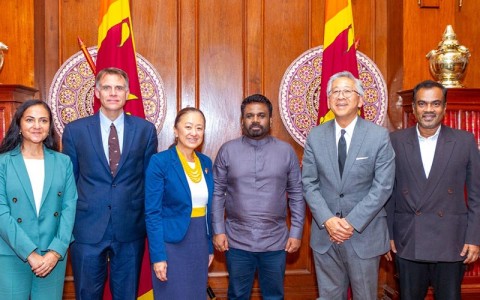
– Says U.S. Assistant Secretary of State for South and Central Asian Affairs Donald Lu
The U.S. Assistant Secretary of State for South and Central Asian Affairs, Mr. Donald Lu expressed the United States government’s commitment to supporting Sri Lanka’s on-going anti-corruption initiatives as needed during a meeting with President Anura Kumara Dissanayake at the Presidential Secretariat today (07).
Mr. Lu stated that the US is prepared to provide financial and technical assistance to strengthen Sri Lanka’s security and economy. He also emphasized the US government’s willingness to offer technical expertise to help recover funds that were illegally taken out of the country, as part of Sri Lanka’s anti-corruption program.
The discussion highlighted the US government’s appreciation for the new administration’s prioritization of key political, economic, and social challenges. Mr. Lu reaffirmed US support for safeguarding Sri Lanka’s sovereignty and territorial integrity.
President Anura Kumara Dissanayake, speaking at the event, highlighted that Sri Lanka’s political culture significantly influences corruption and waste. He emphasized that efforts are underway to reduce these issues by fostering a new and improved political culture.
The President also spoke about initiatives to uplift rural living standards through improvements to the rural economy and efforts to establish a modern civil service by enhancing the quality of public services.
The meeting was attended by Minister of Labour and Deputy Minister of Economic Development Anil Jayantha Fernando, Secretary to the President Dr. Nandika Sanath Kumanayake, Additional Secretary to the President Roshan Gamage, U.S. Ambassador to Sri Lanka, H.E. Ms. Julie Chung, USAID Deputy Assistant Administrator for Asia Ms. Anjali Kaur, Deputy Assistant Secretary for Asia and the Pacific at the U.S. Department of Treasury Mr. Robert Kaproth, USAID Mission Director Gabriel Grau and Counsellor for Political and Economic Affairs Ms. Shawn Gray, among others.
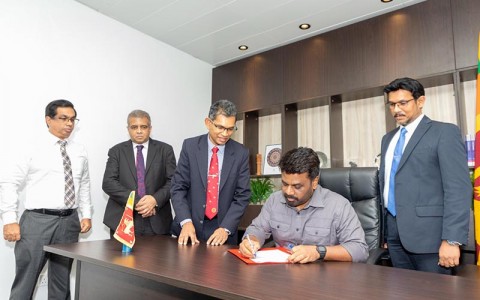
- Digital economy expected to generate USD 15 billion in revenue within the next five years
– President highlights these goals upon assuming duties as Minister of Digital Economy
President Anura Kumara Dissanayake emphasized the need for the support of all professionals to digitize the country and actively participate in the process, at a time when the expectations of the political establishment and digital technologists are aligned.
He further assured that he would firmly stand by this vision at any time.
The President shared these remarks while addressing officials of the Ministry of Digital Economic Affairs after assuming duties as the Minister of Digital Economic Affairs today (05).
Highlighting the benefits of digitalization, the President stated that it has the potential to enhance the efficiency of economic activities and elevate the country’s economy to greater heights.
The President highlighted that the government’s primary objectives are poverty eradication, transforming social attitudes, and advancing digitalization.
The President emphasized that a country’s development cannot be achieved solely by constructing buildings. Reflecting on the past, he recalled the existence of a dedicated construction ministry two decades ago and noted that currently, construction activities are being undertaken by every ministry.
He revealed that during discussions with the Ministry of Education authorities and university chancellors last year, no attention was given to education reforms, with the focus remaining solely on building construction.
President Anura Kumara Dissanayake also highlighted that despite the Ministry of Labor possessing two large buildings, there has been no reduction in public queues, stressing that digitalization is essential to address such issues effectively.
The Ministry has outlined a plan to generate an income of USD 15 billion within the next five years through the digital economy.
Efforts will also be directed towards increasing the digital workforce to 200,000 and digitizing the entire country within the same timeframe.
Engineer Eranga Weeraratne assumed duties as the Deputy Minister of Digital Economy during this occasion.
The event was attended by Secretary to the President Dr. Nandika Sanath Kumanayake, Secretary to the Ministry of Digital Economy Waruna Sri Dhanapala, Senior Advisor to the President on Digital Affairs Hans Wijayasuriya, who is also the Chairman of ICTA, along with a group of officials.


